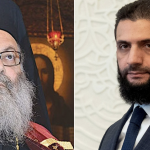By Corriere della Sera –
The Egyptian general wants to turn the religious and archaeological site into a tourist hub. Greece is outraged.
In the end, at bottom, it’s just a Christian monastery. So what if it’s the oldest in the world. If it was founded by the mother of Emperor Constantine. If it rises on the very spot where Moses received the Commandments and the biblical burning bush was set aflame. If it houses a marvelous Byzantine library, second only to the Vatican’s, and one of the most important collections of icons in the world. If it was protected by Muhammad himself, then defended by Crusaders, and even became sacred to Jews. If not even Napoleon dared touch it, and it survived attacks by ISIS. What does it matter that UNESCO sanctified it as one of humanity’s great world heritages.
In Abdel Fattah Al-Sisi’s Egypt, there is no god but tourism, and the general’s will is the only law.
On May 28, three judges in Sinai reopened a case entitled “The Governor vs. the Monks of Saint Catherine’s Monastery”. They reviewed the files, examined the evidence. And finally ruled—after fifteen centuries of history, after years of pressure since the Muslim Brotherhood’s time in power—that the moment had come to change its purpose: “The State owns this site as public property,” and therefore has “the right to use it as it wishes.” From a place of Resurrection, to a resort for vacationers. It has always been the dream of the raïs: to transfigure Saint Catherine’s and link it less to the divine than to the diving tours for visitors from Sharm el-Sheikh. “The goal,” a source told AsiaNews, “is to make it an attraction like the Pyramids or Nile cruises.”
The monastery has always welcomed tourists, 4–5,000 per week, but Cairo says that is too little. In the heart of a nature reserve, major hotels are being planned to attract masses of Americans and Europeans, bypassing the only obstacle: the Greek Orthodox monks, who provide work in their olive groves to hundreds of Bedouins—people the regime does not like. The siege has lasted for years. And the loophole appeared when the monks, pressed by the Sinai governor, were asked to retrieve from the archives ancient 6th-century documents—now impossible to find—that legitimized their ownership. Government-appointed magistrates thus ruled without hesitation. And where once Moses’ staff struck the ground, the ruling says, the State will now strike the cash register: the monastery must pass into government ownership and the monks must leave their cells—“they may remain only to perform their religious duties, and only for as long as the new owner,” meaning Al-Sisi, “is willing to allow it.”
In Greece, indignation erupted immediately. “Scandalous,” said Archbishop Ieronymos of Athens: “We are witnessing yet another collapse for Hellenism and Orthodoxy. A violation of religious freedom. The world’s oldest Orthodox Christian monastery is entering a time of severe trial, evoking far darker moments of history.” The powerful Greek community in the U.S. also rose up: “Saint Catherine’s is a place trodden by God Himself,” declared Archbishop Elpidophoros. “This is the heritage of all humanity. Within these walls Christians, Jews, and Muslims have always found peace. The Egyptian government must commit to keeping it intact.”
Greek Prime Minister Kyriakos Mitsotakis also raised the monastery’s banner, fearing an Islamist challenge, promising to “preserve its character as a pilgrimage site” and to “resolve the issue.” He has already phoned a concerned Al-Sisi. Who now, facing protests, backpedals and recalls “the ancient ties between Greeks and Egyptians,” pledging publicly to “safeguard its unique and sacred religious status, ensuring it will not be violated.”
Twenty days earlier, the Egyptian president had discussed the monastery during an official visit to Athens, and his foreign minister quickly assured that no one would ever touch Saint Catherine’s: “Its religious and archaeological significance will remain absolutely intact,” since the judges’ ruling and the state’s claims concern “only some of the monks’ lands, far from the monastery.”
So is the quarrel over, peace restored? Hardly. According to the Pontifical Institute for Foreign Missions (PIME), the decision to close the monastery is still pending. Diplomatic sources believe Saint Catherine’s could become a bargaining chip. Greece and Egypt have just signed a $5 billion project to lay 1,000 km of submarine pipelines: as an alternative to sanctioned Russian gas, these will bring low-cost energy from North Africa to Europe. When talking with Mitsotakis about both the cables and the monastery, Al-Sisi did not promise that plans to exploit Sinai for tourism would be revised. “That’s where the energy we give you comes from; that’s our future.” And what does it matter, in exchange, to sell off a bit of the past.
____________
Translated from:





